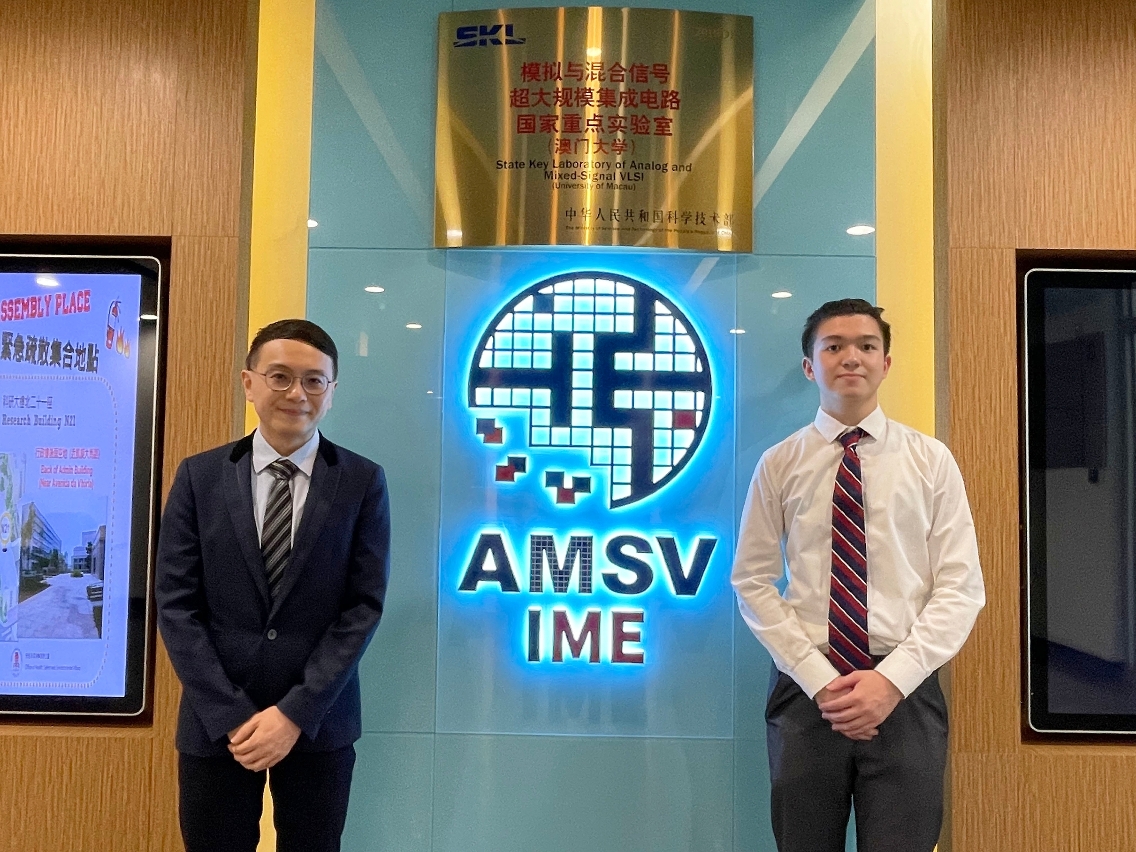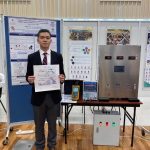 Chan Pak Ian (right) and Prof Lam Chi Seng
Chan Pak Ian (right) and Prof Lam Chi Seng
Chan Pak Ian, a first-year PhD student in the Department of Electrical and Computer Engineering of the Faculty of Science and Technology (FST), the State Key Laboratory of Analog and Mixed-Signal VLSI, and the Institute of Microelectronics at the University of Macau (UM) received the 13th China Youth Science and Technology Innovation Award. He is one of the 89 awardees across the country and the only university student in Macao to receive this honour this year.
As the highest award for youth science and technology innovation in China, the China Youth Science and Technology Innovation Award was established in 2004 to commemorate the 100th anniversary of the birth of Deng Xiaoping and is jointly organised, reviewed, and selected by the Central Committee of the Communist Youth League of China, All-China Youth Federation, All-China Students’ Federation, and the National Permanent Standing Commission-Young Pioneers of China. Since 2004, more than 1,000 students have received this award. The organisers believe that Chan has already attained plenty of academic and creative achievements, developed a good sense of technological innovation, and has huge potential for innovation and growth. This is reflected by his recognition by leading international institutions that have published his research papers, the technology transfer of his research results, his outstanding academic performance, and his hard work and dedication during his undergraduate studies. Based on the above, Chan was awarded the China Youth Science and Technology Innovation Award for his innovative spirit and ambition to serve the country through science and innovation.
Thanks to the guidance of FST Associate Professor Lam Chi Seng, Chan already produced a variety of research results during his undergraduate studies. He graduated from the Department of Electrical and Computer Engineering of the FST in 2022 and began his PhD studies in the department in August in the same year.
During his busy undergraduate studies, he spent his spare time working on a project titled ‘Practical Application of Advanced Controlled New Generation Current Quality Compensation Device’, which was funded by the Science and Technology Development Fund, Macao SAR (File no: 0027/2021/A1). He has authored or co-authored six papers with team members of the above project. Two of them have been published by internationally-renowned journals in power electronics, namely IEEE Transactions on Industrial Electronics (SCI, Q1) and IEEE Journal of Emerging and Selected Topics in Power Electronics (SCI, Q1), and three of them have been published by the Annual Conference of the IEEE Industrial Electronics Society. One of the papers is still under review process by the journals mentioned above.
In addition, Chan is actively involved in a UM project to apply a new generation current quality compensation device to the Macao Water Supply Company Limited. The research team is now discussing the details of production via an industrial platform with enterprises in mainland China. Chan also developed a new single-phase hybrid active power compensation device for his undergraduate final year project. The project received the FST Dean’s Honorary Award for Final Year Project and the Best Final Year Project Award of the Department of Electrical and Computer Engineering. It also won the championship of the IEEE IES Macao Chapter 2022 Undergraduate Project Competition. Chan entered the Dean’s Honor List every year during his undergraduate studies and received two MGM Elite Scholarships as well as one Macao Foundation Scholarship. Because of his outstanding academic and research achievements, he was admitted to UM as a direct PhD student and was awarded the UM PhD Assistantship.



